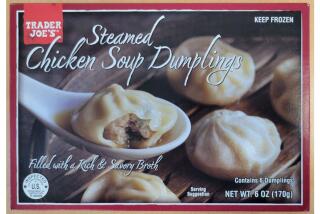Chicken Soup Ad Deceptive, U.S. Contends
The Federal Trade Commission on Thursday accused Campbell Soup Co. of deceptive advertising for claiming that the firm’s Chicken Noodle soup may help reduce the risk of heart disease without disclosing its salt content.
The FTC administrative complaint said Campbell’s advertisement, which appeared in national magazines last winter, failed to disclose that its soups contain high levels of sodium, which may contribute to heart disease.
“The company’s failure to make this disclosure is deceptive,” the regulatory agency alleged. “Campbell did not have substantiation for its claims, and the representation that it did is false.”
Campbell officials deny that the ad was misleading.
A spokesman for the Center for Science in the Public Interest, a nonprofit consumer advocacy group that in February sought the FTC investigation, was pleased with the finding, but said the FTC should have taken even stronger action.
The FTC is seeking an order from an administrative law judge that would require Campbell, in ads that mention heart disease, to disclose sodium content for any soups with more than 500 milligrams in each 8-ounce serving. Campbell’s Chicken Noodle soup, the soup in the disputed advertisement, contains 910 milligrams of sodium in an 8-ounce serving, according to company officials.
Other States Investigate
The advertisement--part of the firm’s “Soup is Good Food” campaign--said Chicken Noodle soup contains low levels of fat and cholesterol and that a “diet low in fat and cholesterol may help reduce the risk of some forms of heart disease.”
“Health-related information is very important to consumers, therefore we want that information (to be) accurate,” said FTC spokeswoman Susan B. Ticknor.
The FTC complaint coincides with an investigation of the advertisement by California and seven other states. A decision on whether California will file suit against Campbell is expected in the next several weeks, according to Deputy Atty. Gen. Albert N. Shelden.
The FTC may also ask the judge to order Campbell not to advertise that its products may reduce the risk of heart disease without substantiation. Campbell could be fined $10,000 for every violation of the judge’s order, Ticknor said.
The FTC cannot seek fines for advertisements that have already run, she said.
Campbell spokesman James H. Moran said executives at the company’s headquarters in Camden, N.J., have not seen the complaint but believe that the ads are not misleading and say they will contest the commission’s complaint. “We stand behind the ad,” he said.
Campbell ran the two-page advertisement in magazines from October, 1987, to February, 1988. The discontinuation of the ads had nothing to do with the FTC investigation, Moran said.
He said Campbell, which controls about 66% of the country’s annual $2.3-billion soup market, did not mislead consumers because the salt content is on every can of the firm’s soups. “It’s not that we don’t tell the public sodium levels,” he said. “We give them the information.”
More to Read
Inside the business of entertainment
The Wide Shot brings you news, analysis and insights on everything from streaming wars to production — and what it all means for the future.
You may occasionally receive promotional content from the Los Angeles Times.










